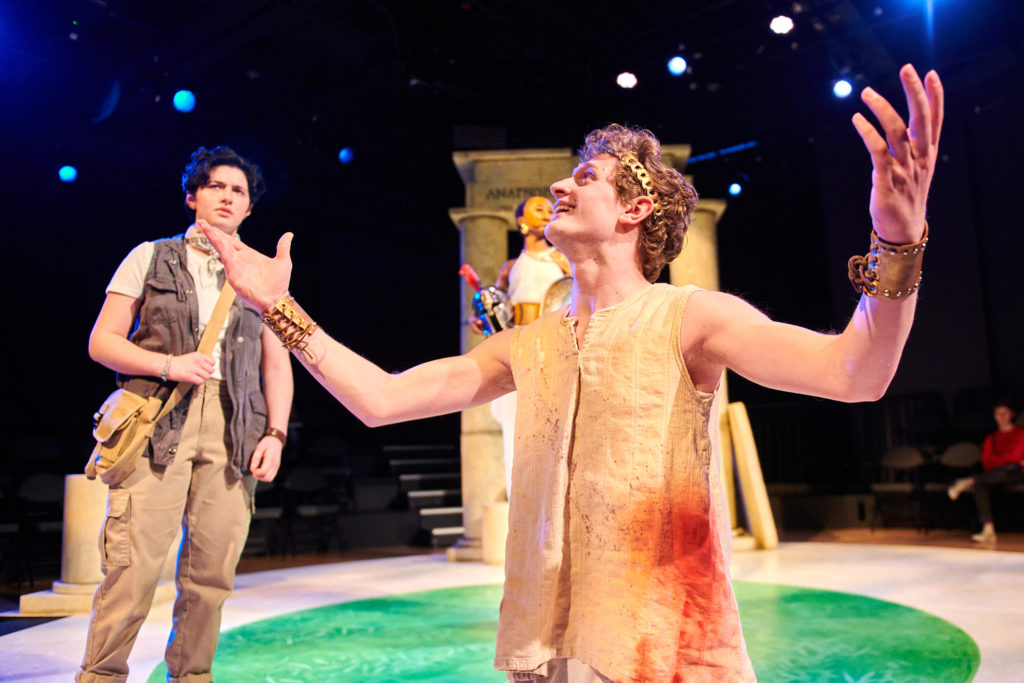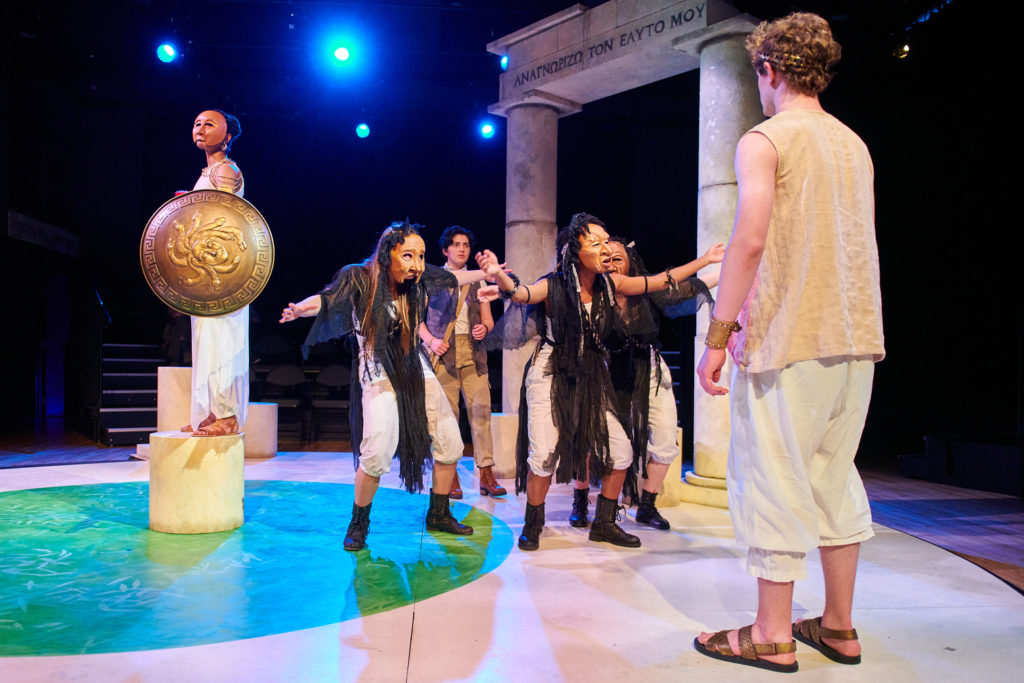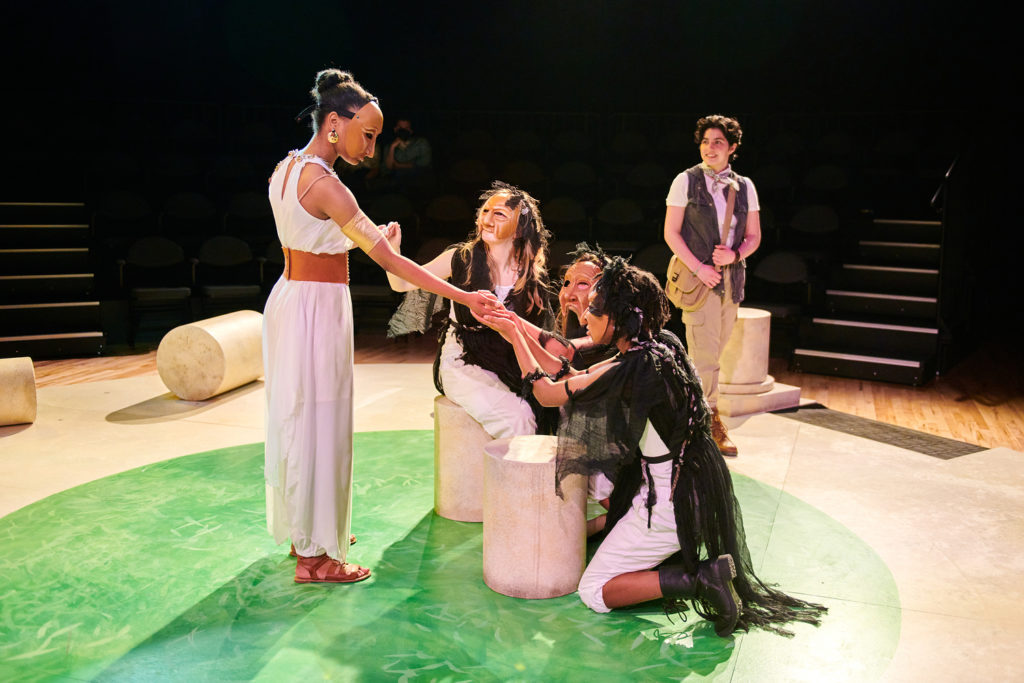
The Gracious Sisters is written by Alice Austen and described as a free adaptation of The Eumenides by Aeschylus. And I can’t believe I spelled both of those Greek names correctly the first time without looking them up (thank you Corliss Phillabaum). And the Gracious Sisters is part of the World Premiere Wisconsin event playing across state stages this spring.
Now, back to that free adaptation note. Yes, the story for the most part is true to Aeschylus and there are gods and mortals and murder and mayhem and all of the requisite attributes of a Greek Tragedy. And at first, great I don’t have to worry about ‘spoiler alerts’ because the original story resides pretty much in the public domain. From Aeschylus through Rick Riordan, the Greeks are alive and well. But that free adaptation: how do I work the modern elements into my review without spoiling something. Well fortunately First Stage beat me to it with their very clear and concise story synopsis. So let me quote!
When archaeological intern Alice falls down an ancient Greek rabbit hole, she discovers the aftermath of a violent murder, with the goddesses of vengeance, or “Furies,” chasing down the accused to exact bloody retribution. Athena, the goddess of wisdom (and war), persuades the Furies that the accused should have a fair trial before a jury. When the jury is divided in a split decision, all must come to terms with the balance of a desire for vengeance, and the need for grace.

So we take a classic story and bring it forward to the 21st Century for all of us 13 and older to enjoy…with ancient plot and contemporary subtext. Subtext!! Where did I hear that before?
Well, when Alice meets Clytemnestra, she refers to her as a ghost…which appalls Clytemnestra who then screams SPIRIT because “Spirit has subtext”. And subtext indeed but it isn’t exclusive to our wronged ghost, but subtext rules the play, the characters, and the scenes. Subtext links us to the ancient Greeks!

Angel Rivera plays our Alice in wonderland, who at first is confused by her new found surroundings, but quickly comes to grip with the characters and situations as she brings her knowledge of Greek mythology to bear…and she puts some of the Greek characters, both mortal and divine, ill at ease by her knowledge of their pasts and futures. Rivera is enchanting here and emphatically plays a character beyond their years. And Alice, by happenstance and misunderstanding, bonds with the Furies who are bedeviling Orestes near to death…and Rivera clearly enjoys the character’s swing from outsider to instigator!

And the Furies are played to the hilt…swirling sprites, threatening goblins, glib orators, determined vigilantes, and a right nice Greek Chorus. Out Furies are Silver Anderson as Tisiphone, Rose Campbell as Alecto, and Hazel Dye as Megaera. These young actors worked tightly as a troupe through their hauntings and dances. The choreography for three free spirits working in unison can get pretty tricky at times. And they make a wonderful chorus and the music here is just right and they bring it to our ears with style (and amazing voices)!

And we have two major gods here. Zachary Nowacek brings us a regal and imperial Apollo, sure of his power and of his place in the Greek pantheon. And Terynn Erby-Walker as Athena, reigns over Athens with a certain combination of regal pomp and grace. And she reigned over the final scenes as a statue in her temple as turmoil was breaking out all around her feet. Quite an amazing ability to remain still. But then Erby-Walker came to life and ruled over the fate of Orestes with a clear certainty and vigor. And earlier in the play Erby-Walker also gave us the messenger god, Hermes, with just the right bit of impishness and devotion.
But other than Alice, you could picture these other characters as supporting roles because our central theme is Orestes murder of his mother Clytemnestra. Both mortals, they are essentially play things of the gods but still feel their own agency. Orestes is played by John Eash-Scott, who gives us the full gamut from fearful supplicant to boastful antagonist in just the right amounts and at just the right times. And the ghost, yikes, the spirit of Clytemnestra is Elena Marking. Marking gives us all of the anguish of an unsettled spirit and the bitterness of a wronged spouse and mother. And her hauntings of the periphery provides the right amount of spooky presence until Marking brings Clytemnestra to life in the spoken and ensemble bits.

And Reiley Fitzsimmons plays two roles…separate…but…related: Pythia, an oracle to Apollo, and Esme, the court reporter during the trial, after her role of oracle has ended. Both characters are mortals and bring some comic relief to the proceedings. And Fitzsimmons last part, as the court reporter, not only brings a bit of humor but feels the closet to a contemporary of the 21st Century other than Alice.
And Austen’s text brings out a few questions about the gods…how did they wield all of that power while being so capricious and contrary in their actions? That might keep me up at night.
The Gracious Sisters is a presentation of The Young Company and it is amazing how effectively they present some pretty serious adult themes and plays. And I think the Gracious Sisters is a fine fine example of that! And director Matt Daniels really brought out superb acting from these young people…in roles that may not be that familiar to them.
One bit of a spoiler maybe, but something I wouldn’t want to miss. Get there a few minutes early…the cast does a silent walk through the stage in costume and character…and you will get a feel for the characters that you are about to meet at curtain!
The Gracious Sisters continues through May 21, 2023 at the Milwaukee Youth Arts Theater and is recommended for families with children 13 and older.
Some extra credit reading: The Playbill!
